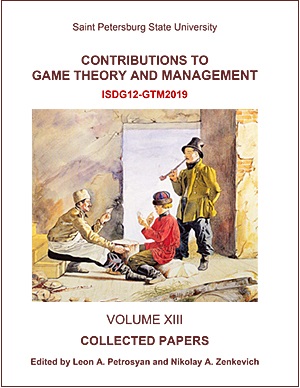The Dynamic Nash Bargaining Solution for 2-Stage Cost Sharing Game
DOI:
https://doi.org/10.21638/11701/spbu31.2020.15Abstract
The problem of constructing the Dynamic Nash Bargaining Solution in a 2-stage game is studied. In each stage, a minimum cost spanning tree game is played, all players select strategy profiles to construct graphs in the stage game. At the second stage, players may change the graph using strategy profiles with transition probabilities, which decided by players in the first stage. The players' cooperative behavior is considered. As solution the Dynamic Nash Bargaining Solution is proposed. A theorem is proved to allow the Dynamic Nash Bargaining Solution to be time-consistent.
Keywords:
Dynamic Nash Bargaining, dynamic game, minimum cost spanning tree
Downloads
References
Downloads
Published
How to Cite
Issue
Section
License
Articles of "Contributions to Game Theory and Management" are open access distributed under the terms of the License Agreement with Saint Petersburg State University, which permits to the authors unrestricted distribution and self-archiving free of charge.




